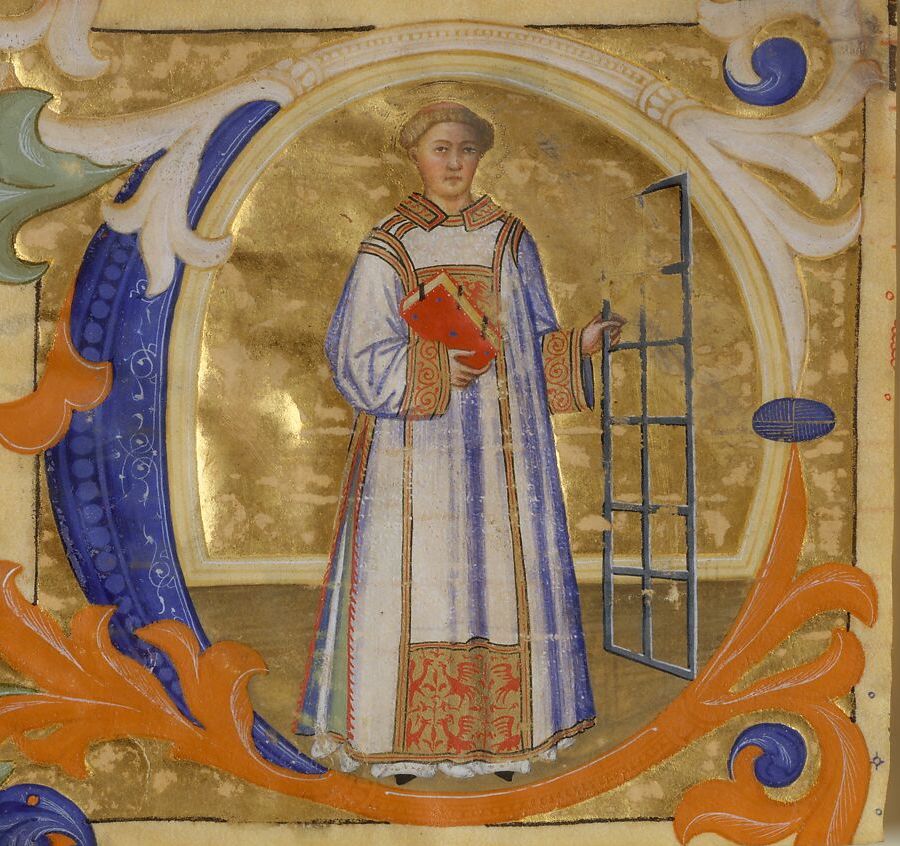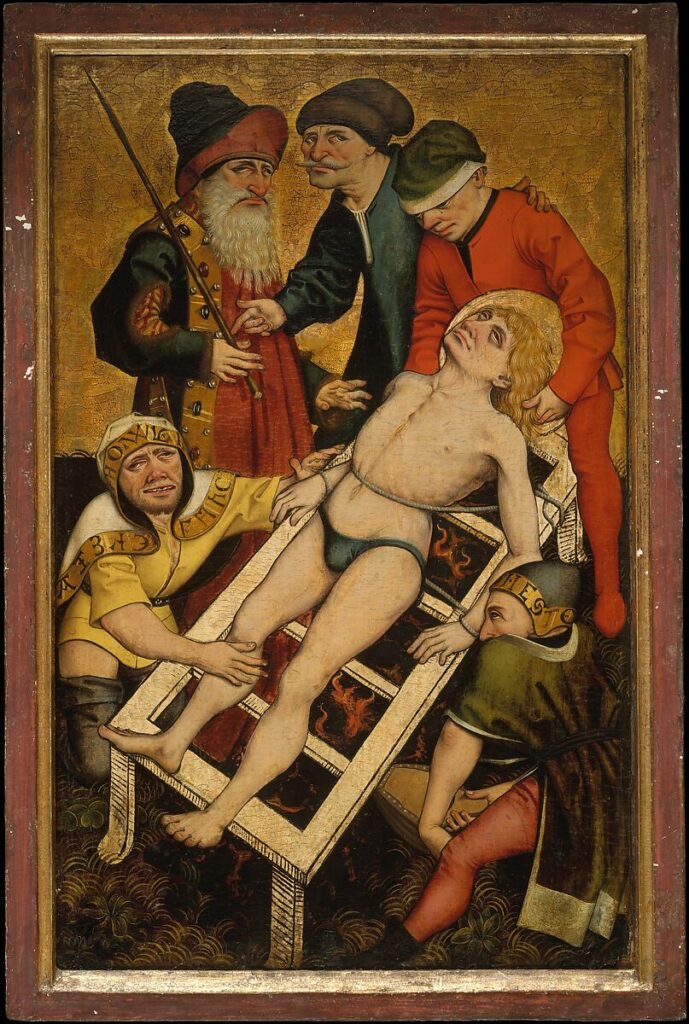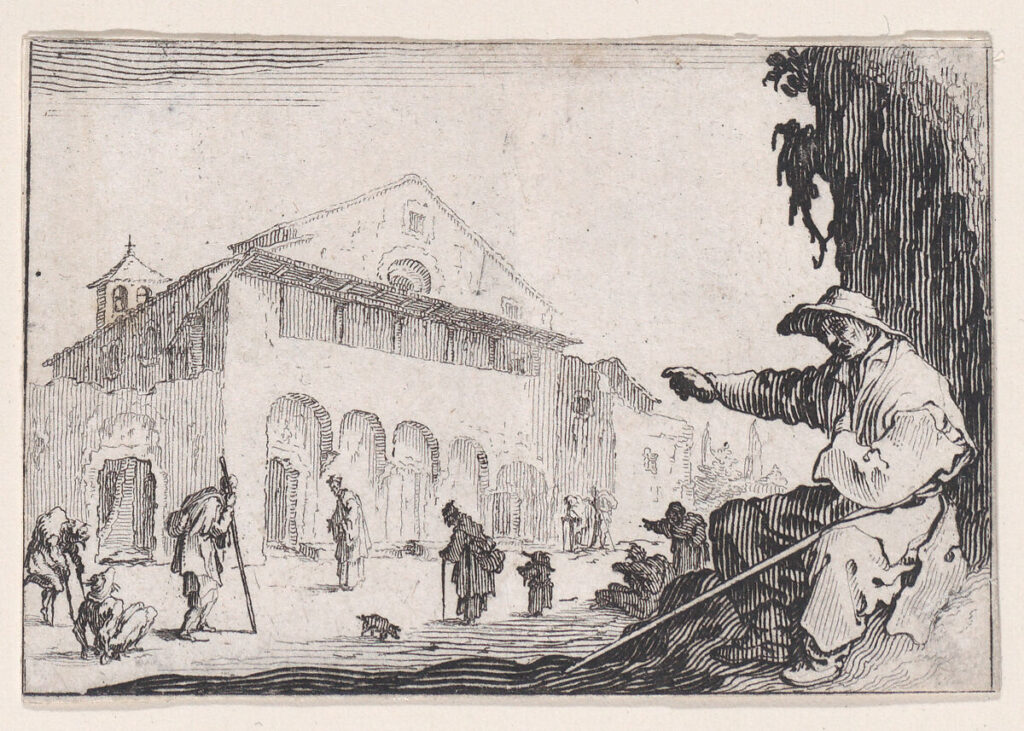Feast Day: August 10
I’m pretty sure it was Lawrence’s humerus. I’m not the kind of doctor that has memorized all the bones in a human body, but several years back I saw a severed relic of St. Lawrence in England’s Ampleforth Abbey that matches Google’s pictures of upper arm bones. I’ll admit that looking up medical facts online isn’t always a good thing (I usually come away psyched to discover that I’ve survived the symptoms of two dozen fatal diseases); in this case, the answer seems to be simple. Quite appropriately, the humorous saint left his humerus for me to view.

St. Lawrence and the Valerian Persecution
Lawrence lived during the glory days of the Roman Empire. He may have originally hailed from Roman Spain. He first entered the historical record as a deacon in the city of Rome. This bright young churchman attracted the attention of one of the leading Roman priests who, in 257 A.D., became Pope Sixtus II. Sixtus appointed Lawrence to serve as his righthand man, effectively running the administration for the Diocese of Rome including its charities.
The growth of Christianity met growing persecution. The Emperor Valerian first forbade gatherings for Christian worship and then ordered the summary execution of all bishops, priests, and deacons. On August 6, 258, a few days after his edict, authorities captured Sixtus and several of the deacons of Rome when he said Mass in one of the cemeteries. They were all executed—except Lawrence.
The officer in charge knew that Lawrence administered church finances and seems to have assumed that a new-fangled religion focusing on crazy notions like a single God and bodily resurrection must be a cult existing to bilk its adherents out of their money. So he cut the deacon a deal. If Lawrence would hand over the treasure of the Church, the officer would conveniently forget Lawrence’s identity. Lawrence agreed with one caveat: he needed three days to gather the Church’s treasure from around the city.
Lawrence’s Wit and the Treasures of the Church
Three days later, the official came to the designated location to receive his bribe. A horrid sight confronted him—at least horrid from the perspective of an upperclass pagan. The homeless in their rags, cripples with oozing sores, the coughing sick, widows with crying babies, and more human refuse from the city filled the courtyard. Lawrence leaned against the side of house talking with the crowd. Then he saw the Roman posse arrive. He sprang forward smiling. His arm swept out in an expansive gesture, encompassing the crowd.
“I did it! Here are the treasures of the Church gathered for you to see,” said Lawrence. “This is where the money given in Jesus’s name goes in service of what God treasures.”

The official was not amused. The Romans were masters of torture, a trait shared with many other supposedly civilized regimes from Antiquity to the Renaissance to the twentieth century. Determined not to be thwarted in his greed and unwilling to question his assumptions, the official had Lawrence tortured to death. As Lawrence suffered, the torturers pressed him to renounce Christianity and, more importantly, to reveal the location of the imaginary gold and silver. Lawrence, of course, could not reveal what did not exist. Instead he prayed for perseverance and prayed for his persecutors. God miraculously shielded him from some of the pain as the Romans literally grilled him alive. With God’s help, the irrepressible deacon managed one final quip before his death:
“You can turn me over now. I think I’m done on that side.”
Humor and Holiness
I love how the Church’s oral tradition preserved these quips. The stories probably evolved in the century of telling before being written down, but it says something about Christianity that its followers wanted to remember a puckish martyr. It’s inspiring to see a person approach difficulty with cheerful humor. Other Roman Christians facing persecution needed that inspiration as also have many later Christians (perhaps including St. Thomas More’s wry scaffold humor).
The humor continues in how Lawrence is remembered. My high school students would always get a chuckle out of Lawrence being honored as a patron saint of cooks, especially those who barbecue. Whichever Catholic first linked Lawrence being grilled to death with cooking a summer picnic certainly had a sense of humor. Lawrence also serves as a patron of comedians, the poor, and firefighters.
Lawrence pranking the officials over Church treasures or giving advice on being grilled did make serious points. True Christianity values the rejected people in society over money. The Roman government had misjudged the Church and Lawrence’s humor gave its officials a chance to realize their error. His quip during torture should also have served as a hint that God had the power to protect his believers; any experienced Roman torturer would have known that this kind of endurance could only be supernatural. Again, humor was a gentle invitation to see the truth of God and His work in the world. In both cases, the Roman official in charge failed to learn, but tradition says that other witnesses did.

Joy and Meaning
Modern culture all too often equates darkness with meaningfulness. Look at the Oscars, for example. Comedies and comedic actors rarely take home top honors. Making people laugh isn’t taken seriously. Yet the most popular movies are often those that bring joy into people’s lives, at least for a couple hours. The critics are missing something that the average moviegoer sees.
Catholic theology has long listed joy as a gift of the Holy Spirit (see Galatians 5:22). I remember one priest who said he loved being Catholic because, with the saints, there’s always a feast day to celebrate so there is always a reason to party. Admittedly, there are six weeks of Lenten penance, but that’s followed by eight weeks of Easter celebration (at least if you follow the liturgical calendar and resist modern culture’s attempts to reduce feasts like Easter and Christmas to a single day). If the Good News is true, then the most fundamental level of reality is joyful: God is Love and we have been redeemed by that love to spend all eternity with Him. “Serious” reflections that dismiss laughter and joy have failed to understand the deepest meaning of our lives and world.
There is a sense in which our world is a “vale of tears.” We suffer. We see loved ones suffer. We see people suffer injustice. We need to do penance for our sins. All of that is true. St. Lawrence reminds us that none of that is the final word. He went through the death of his friends and his own torture because he had the joy of seeing his Lord’s love present even in those moments and because he knew they led to eternal happiness. Moreover, he had hope that his own joy would attract others to find and accept the same joy in their lives with God.
So feel free to smile even if the world’s imperfect. And go ahead and say a prayer to St. Lawrence for perfect burgers as you light up that grill. It may seem like a weird cooking routine to remember a man’s torture from eighteen centuries ago, but, if you’re remembering the joy that inspired Lawrence to serve the poor and to follow God when you pray and light that fire, I think Lawrence will get a laugh out of it.
If you have a response, thoughts, or questions, please comment at the bottom of the page. Consider subscribing below to get weekly email notifications about new reflections and other news.



All Lawrences should be so proud to share the name of this heroic saint.